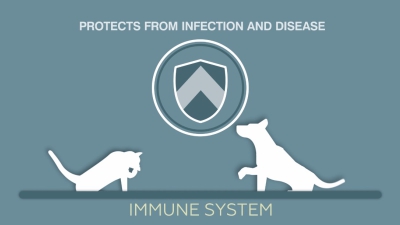Proteins play an important role as they are an essential component of the skin and hair. Hair is 95% protein and almost 1/3 is used for skin renewal and hair growth. The role of protein is therefore fundamental to the beauty of the skin and coat.
VETERINARY HPM® CAT FOOD FOR BABY PRE NEUTERED CATS
Kittens have strict requirements for healthy growth, especially in terms of energy, proteins, and minerals. They also have a delicate digestive system and an immature immune system. VETERINARY HPM® responds to these specific needs.
- For kittens, from weaning up to 12 months old if not neutered
- Suitable for pregnant and lactating cats
- Supports intense and rapid growth
- Immune support to enhance vaccine response and improve resistance to diseases
Available sizes:
- 0,4 kg
- 1,5 kg
With 44% high in proteins, of which 91% are animal proteins, and 20% low in carbohydrates, VETERINARY HPM® is the best kitten food for meeting the demanding nutritional needs of growing kittens. This high protein kitten food is specially formulated for young cats to support rapid development, strong immunity, and healthy digestion. Designed with a strict carnivore’s biology in mind, it offers a nutrient-rich profile to build strong muscles and overall vitality. Our dry kitten food ensures optimal nutrition from weaning to 12 months. Choose premium kitten food that supports growth, immune function, and long-term health—choose VETERINARY HPM®.
Nutrion for carnivorious paragraph
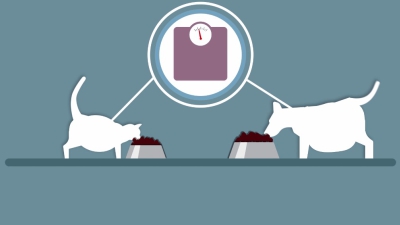
By promoting satiety and the development of lean body mass (including muscle) rather than fat, protein helps dogs and cats maintain a healthy weight. Fibre is also added as well as L-carnitine to help limit fat storage.
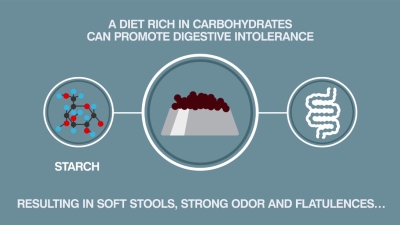
A food that is too rich in carbohydrates can be poorly tolerated and cause loose stools and unpleasant odours.
Low carbohydrate levels, well digestible proteins and the addition of functional ingredients (lactobacilli, montmorillonite, sepiolite, etc.) help to maintain good digestive tolerance.
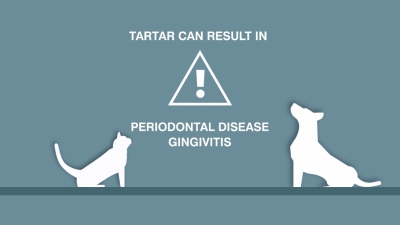
Pentasodium triphosphate supplementation helps to limit plaque and tartar formation and contributes to good oral health.
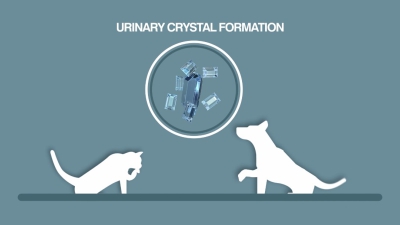
By stimulating drinking and promoting naturally acidic urine, protein helps to maintain good urinary health.
A functional ingredient, cynarin, is also added to help dilute his urine.
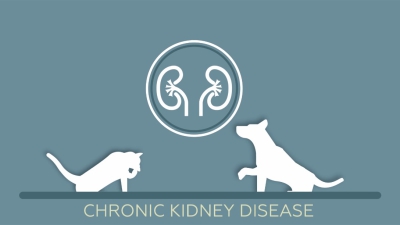
High protein content contributes to efficient water turnover in the body. Controlled phosphorus intake helps maintain good kidney health.
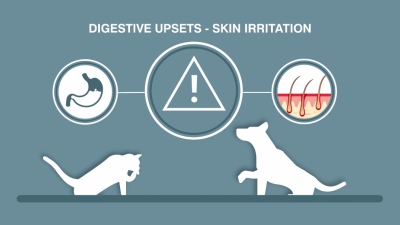
To avoid food allergies, our food does not contain beef, dairy, egg, wheat, corn, gluten or soy (ingredients that can cause food allergies), which reduces the risk of food intolerance.
The high protein content helps to maintain muscle mass. Chondroitin and chitosan supplementation helps maintain joint elasticity.
VETERINARY HPM® for kittens is formulated to support optimal growth and development. As a high protein kitten food, it delivers the essential nutrients needed for building strong muscles and supporting a developing immune system.
This dry kitten food offers a balanced composition tailored to the nutritional needs of growing cats, making it one of the best kitten food options available. Backed by science and trusted by veterinary professionals, it stands out as a premium kitten food for everyday feeding.
Dehydrated pork and poultry proteins, Animal fats, Potato starch (min. 4%), Hydrolysed pork and poultry proteins, Peas, Rice (min. 4%), Minerals, Faba bean hulls, Beet pulp, Lignocellulose, Brewers yeast, Linseed, Fish oil, Psyllium fibre (Plantago (L.) spp.), Fructo-oligosaccharides, Hydrolysed crustacean (source of chitosan), Chondroitin sulphate, Lactobacillus acidophilus.
Veterinary HPM® does not contain any artificial colours or flavours.
Analytical constituents :
(% as fed)
| Analytical constituents (% as fed) |
|
|---|---|
| Moisture | 5.5 % |
| Protein | 45 % |
| Animal to vegetal protein ratio | 92/08 |
| Fat | 20 % |
| Minerals | 8,5 % |
| Crude Fibre | 4 % |
| NFE * | 17 % |
| Starch | 13,5 % |
| Calcium | 1,3 % |
| Phosphorus | 1,1 % |
| Sodium | 0,7 % |
| Omega-6 | 3,3 % |
| Omega-3 | 1 % |
| ME** calculated | 412 kcal/100g |
| ME** measured in vivo | 430 kcal/100g |
| * Nitrogen Free Extract: Carbohydrates ** Metabolisable energy |
|
| Functional ingredients | |
|---|---|
| Beta glucan | 500 mg/kg |
| Bentonite | 5 g/kg |
| Killed lactobacilli | 7 mg/kg |
| L-carnitine | 540 mg/kg |
| Pentasodium triphosphate | 0,35 % |
| Chitosan | 800 mg/kg |
| Vitamins and trace elements | |
|---|---|
| Vitamin A | 17 000 IU/kg |
| Vitamin D3 | 1 700 IU/kg |
| Vitamin E | 610 mg/kg |
| Vitamin K3 | 0,22 mg/kg |
| Vitamin B1 | 11,2 mg/kg |
| Vitamin B2 | 8 mg/kg |
| Vitamin B3 | 113,4 mg/kg |
| Vitamin B5 | 14,5 mg/kg |
| Vitamin B6 | 7,6 mg/kg |
| Vitamin B8 | 0,15 mg/kg |
| Vitamin B9 | 1,9 mg/kg |
| Vitamin B12 | 0,046 mg/kg |
| Choline | 1 760 mg/kg |
| Taurine | 2 460 mg/kg |
| Copper | 12 mg/kg |
| Iodin | 0,4 mg/kg |
| Zinc | 110 mg/kg |
VETERINARY HPM® is specially designed for growing kittens. As a high protein kitten food, it supports optimal development, strong immunity, and muscle growth during the crucial early months.
This dry kitten food is formulated with carefully selected ingredients to ensure digestibility and overall well-being. It is considered one of the best kitten food options by veterinary professionals and pet parents alike.
If you're looking for a reliable and premium kitten food, VETERINARY HPM® delivers high nutritional value without artificial colours or flavours.
Adapt the rations to your animal depending on its activity level and specific needs.
It is advisable to follow the ration table and make fresh water available at all times.
KITTEN (<12 MONTHS)
| Weight of the cat (kg) | Daily Ration (g/day)* | ||
|---|---|---|---|
| 3 - 5 months | 6 - 8 months | 9 - 12 months | |
| 0,5 | 15 | ||
| 1 | 30 | 25 | |
| 1,5 | 45 | 35 | 25 |
| 2 | 60 | 45 | 35 |
| 3 | 85 | 70 | 50 |
| 4 | 115 | 95 | 70 |
| 5 | 115 | 85 | |
| 6 | 105 | ||
| 7 | 120 | ||
| 8 | 140 | ||
|
* These amounts are indicative and may vary depending on the breed and activity level of the kitten. Before 3 months old, give the food ad lib. For further information, please consult your veterinary surgeon. |
|||
PREGNANT/LACTATING CAT**
| Weight of the cat (kg) | Daily Ration (g/day)* | |
|---|---|---|
| 1st month of pregnancy | 2nd month of pregnancy | |
| 2 | 30 | 45 |
| 3 | 45 | 70 |
| 4 | 60 | 95 |
| 5 | 75 | 115 |
| 6 | 85 | 140 |
| 7 | 100 | 165 |
| 8 | 115 | 185 |
| 9 | 130 | 210 |
| 10 | 145 | 235 |
|
** During the breeding period, switch over from ADULT CAT with SALMON to BABY CAT as soon as the queen comes on heat. |
||
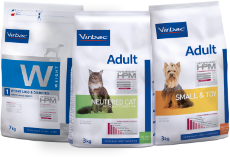
- Can I feed my kitten with a home-made diet?
The food that kittens receive throughout their first year must obviously provide energy and materials to build the skeleton, muscles, and all new tissues. But nutrition doesn't stop there: it must also help kittens develop a fully functioning nervous system and effective immune system. Any deficiency in essential nutrients (those that cannot be synthesized by the animal's body) during this delicate period may affect the cat's future health.
Many recipes developed by veterinary nutritionists are available for owners who wish to prepare a nutritionally balanced home-made diet for their kitten. However, it is illusory to succeed in meeting all the required conditions because the nutritional balance of a household ration is subject to various hazards. Owners will always find it difficult to follow the recipe exactly, the necessary ingredients are not always available, and the nutritional composition can vary considerably depending on the origin of the product. With home-made diets, no laboratory analysis can verify the nutritional composition of the raw materials used.
Therefore, even when accompanied by a mineral and vitamin supplement, home-made diets for cats often show deficiencies in several nutrients such as choline, iron, and thiamine. In addition, cats cannot synthesize vitamin D as humans do (via exposure to UV rays), so this vitamin must be provided daily in the diet. For these reasons, choosing the best adult cat food—commercially prepared with the right balance of nutrients—is a safer and more reliable option as your kitten transitions into adulthood.
- Can I feed my kitten with a vegetarian diet?
The cat is a strict carnivore, which means that certain nutrients it needs cannot be provided by a plant-based diet. Such diets can cause major nutritional deficiencies with serious health consequences. For this reason, a kitten should never be fed a vegetarian diet. Opting for premium adult cat food when the time comes ensures a nutritionally sound, meat-based formula that supports lifelong health.
- Can I feed my kitten with raw meat diets?
Raw meat diets (red meat or chicken) are very popular among certain cat breeders but raw meat diets are deficient in calcium and phosphorus. The Calcium/Phosphorus ratio is totally inappropriate for the feline species, especially in terms of bone growth. Such a diet can cause major nutritional deficiencies with serious consequences on health. For example, when fed exclusively a raw meat diet, the kitten is exposed to the risk of pathologic fractures following minor trauma.

more than 6 vets out of 10 recommend our food
(source: GIE AC 2020 survey, 1519 responses)
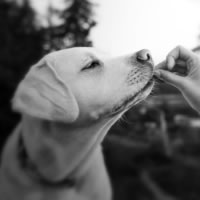
on average, our food is rated above 4/5
(source: * conso animo, shopmium, que choisir and 60 millions conso)

94% acceptance for medium and large dogs, 92% for small and very small dogs and 84% for cats


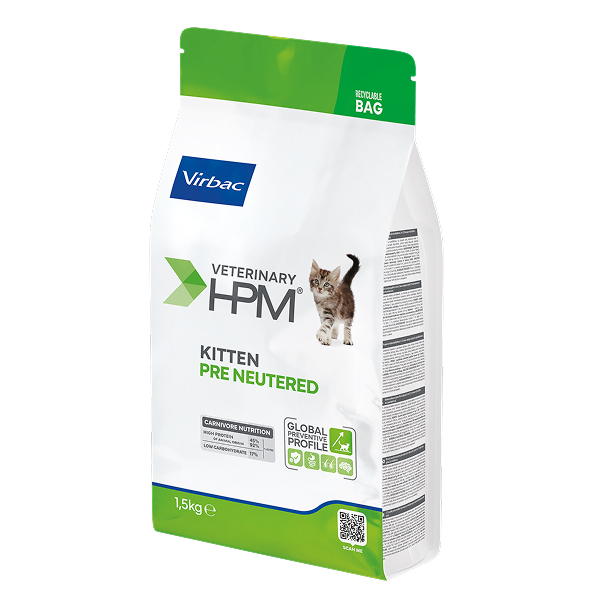
.jpg)
